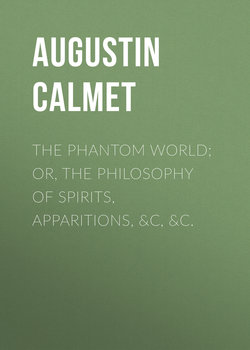Читать книгу The Phantom World; or, The philosophy of spirits, apparitions, &c, &c. - Calmet Augustin - Страница 13
CHAPTER VIII.
OBJECTIONS TO THE REALITY OF MAGIC
ОглавлениеI shall not fail to be told that all these testimonies from Scripture do not prove the reality of magic, sorcery, divination, and the rest; but only that the Hebrews and Egyptians – I mean the common people among them – believe that there were people who had intercourse with the Divinity, or with good and bad angels, to predict the future, explain dreams, devote their enemies to the direst misfortunes, cause maladies, raise storms, and call forth the souls of the dead; if there was any reality in all this, it was not in the things themselves, but in their imaginations and prepossessions.
Moses and Joseph were regarded by the Egyptians as great magicians. Rachel, it appears, believed that the teraphim of her father Laban were capable of giving her information concerning things hidden and to come. The Israelites might consult the idol of Micha, and Beelzebub the god of Ekron; but the sensible and enlightened people of those days, like similar persons in our own, considered all this as the sport and knavery of pretended magicians, who derived much emolument from maintaining these prejudices among the people.
Moses most wisely ordained the penalty of death against those persons who abused the simplicity of the ignorant to enrich themselves at their expense, and turned away the people from the worship of the true God, in order to keep up among them such practices as were superstitious and contrary to true religion.
Besides, it was necessary to good order, the interests of the commonwealth and of true piety, to repress those abuses which are in opposition to them, and to punish with extreme severity those who draw away the people from the true and legitimate worship due to God, lead them to worship the devil, and place their confidence in the creature, in prejudice to the right of the Creator; inspiring them with vain terrors where there is nothing to fear, and maintaining their minds in the most dangerous errors. If, amongst an infinite number of false predictions, or vain interpretations of dreams, some of them are fulfilled, either this is occasioned by chance or it is the work of the devil, who is often permitted by God to deceive those whose foolishness and impiety lead them to address themselves to him and place their confidence in him, all which the wise lawgiver, animated by the Divine Spirit, justly repressed by the most rigorous punishment.
All histories and experience on this subject demonstrate that those who make use of the art of magic, charms, and spells, only employ their art, their secret, and their power to corrupt and mislead; for crime and vice; thus they cannot be too carefully sought out, or too severely punished.
We may add that what is often taken for black or diabolical magic is nothing but natural magic, or art and cleverness on the part of those who perform things which appear above the force of nature. How many marvelous effects are related of the divining rod, sympathetic powder, phosphoric lights, and mathematical secrets! How much knavery is now well known in the priests of idols, and in those of Babylon, who made the people believe that the god Bel drank and ate; that a large living dragon was a divinity; that the god Anubis desired to have certain women, who were thus deceived by the priests; that the ox Apis gave out oracles, and that the serpent of Alexander of Abonotiche knew the sickness, and gave remedies to the patient without opening the billet which contained a description of the illness! We may possibly speak more fully on this subject hereafter.
In short, the most judicious and most celebrated Parliaments have recognized neither magicians nor sorcerers; at least, they have not condemned them to death unless they were convicted of other crimes, such as theft, bad practices, poisoning, or criminal seduction – for instance, in the affair of Gofredi, a priest of Marseilles, who was condemned by the Parliament of Aix to be torn with hot pincers, and burnt alive. The heads of that company, in the account which they render to the chancellor of this their sentence, testify that this curé was in truth accused of sorcery, but that he had been condemned to the flames as guilty, and convicted of spiritual incest with his penitent, Madelaine de la Palu. From all this it is concluded that there is no reality in what is called magic.
